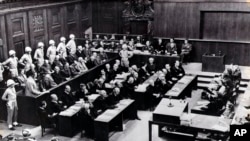Audio recordings from the historic Nuremberg trials of Nazi leaders will be made available to the public for the first time in digital form after nearly two years of work conducted in secret.
The Memorial of the Shoah in Paris will officially accept the recordings at a ceremony Thursday evening.
The files capture several hundred hours of the first, high-profile trial of top Nazi leaders in Nuremberg, Germany, after World War II. Since 1950, they have existed only on 2,000 large discs housed in wooden boxes in the International Court of Justice library in the Hague, Netherlands.
Now, curious listeners will be able to listen to the entirety of the judicial proceedings in reading rooms at the Hague, the Shoah Memorial in Paris, and the U.S. Holocaust Memorial Museum.
Shoah Memorial head archivist Karen Taieb said she hopes the newly digitized audio files will allow researchers and students to better understand a powerful and emotionally fraught moment in history. Researchers previously had access to trial transcripts only.
“You can read the trial, but when you hear the trial, it’s different,” Taieb told the AP. “For the victims, for example, it’s different to hear their voices. The voices are very important, and the hesitation in them.”
The Nuremberg trials, which took place from 1945 to 1949, marked a watershed moment in history and international law. They shed light on the extent of Nazi atrocities during the Holocaust and set new international precedents for defining and prosecuting war crimes.
During the first and most famous trial, held between November 1945 and October 1946, an international panel of judges found 18 high-ranking Nazi leaders guilty on at least one count and sentenced 12 of them to death. Only 28 hours of the proceedings were filmed.
French sound restoration firm Gecko was commissioned to digitize the audio. Project head Emiliano Flores said they kept the project secret to protect the fragile Nuremberg discs from neo-Nazis or zealous collectors.
“We are extremely proud but also a bit relieved it is finished,” he said.
In addition to the audio recordings, film clips presented as evidence of Nazi atrocities during the trial —as well as 250,000 pages of documents and some photos —will be available at the Shoah Memorial for public viewing, Taieb said.




